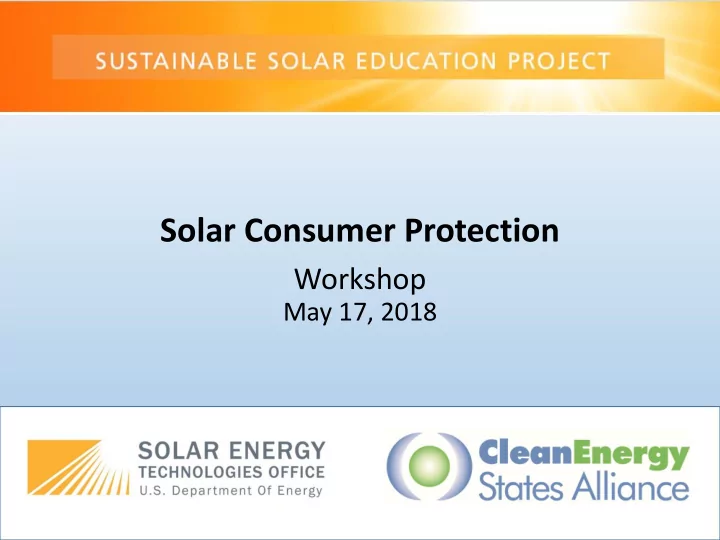

Solar Consumer Protection Workshop May 17, 2018
www.cesa.org
Sustainable Solar Education Project A project to provide information to state and municipal officials on strategies to ensure distributed solar • Remains consumer friendly • Benefits low- and moderate- income households The project is managed by CESA and is funded through the U.S. Department of Energy Solar Energy Technologies Office. 3
Sustainable Solar Education Project Resources The project has produced a variety of resources on solar equitability and consumer protection: • Guides • Webinars • Monthly e-newsletter • In-person workshops www.cesa.org/projects/sustainable-solar 4
Why States Should Care About Solar Consumer Protection • States have the ability to adopt solar programs, policies, and rules that inform and protect consumers. People look to state and local government for information. • If states don’t address these issues proactively, they may have to expend resources to redress problems after they arise. • Government’s job is to set rules and ensure they are followed for the benefit of all. • States have an interest in promoting economic development and maintaining a robust, competitive, and fair marketplace for solar businesses. 5
Potential Reasons Why Solar Consumer Protection Issues Have Cropped Up • Solar is entering into market maturity in some areas • Lower barriers to entry and more product options (e.g., availability of third-party ownership, solar loans, incentives, and community solar) • Decline of state incentive programs means some states no longer have as much control over solar marketing, contracting, and installation processes 6
Solar Consumer Protection Industry Challenges 1. Adopting solar can involve complicated financing and ownership models, long-term contracts, and large financial obligations. 2. Value propositions vary; solar quotes may rely on a range of assumptions and may involve different products. 3. Well known, proven brands haven’t been firmly established. 4. Solar-specific regulatory protections have only begun to emerge. 5. Solar consumer awareness may be low in some areas where the industry is moving into new market niches. 6. Solar has lots of industry jargon. 7. Solar companies often have similar-sounding names. 7
Consumer Protection Issues Solar Marketing ➢ Consumers have difficulty identifying reputable and reliable installers ➢ Incomplete or misleading projections of consumers' cost savings ➢ False advertising claims ➢ High-pressure sales tactics 8
Consumer Protection Issues Solar Products & Contracting ➢ Product confusion (e.g., owning panels, financing panels, leasing roof space, purchasing electricity from certain panels, or purchasing a portion of electricity from an array) ➢ Confusing contract terms and unexpected costs or fees (escalators, high-cost loans, late-payment penalties, termination fees) ➢ Confusion about the applicability of incentives ➢ Confusion about who owns Renewable Energy Credits (RECs) and misleading claims about who receives solar electricity ➢ Solar-related real estate restrictions (UCC filings) 9
Consumer Protection Issues Solar In Installation & Performance ➢ Inadequate warranties or consumers are unable to collect on warranty claims ➢ Installations do not produce as much electricity or otherwise perform as promised ➢ Installations are poor quality or have improper wiring or safety problems 10
Solar Oversight Agencies Contracting & Financing Construction & Technology Manufacturing Electrical • • • • Consumer Financial State Contractor Federal Trade Federal Trade Protection Bureau Licensing Boards Commission Commission • • • • Federal Trade Local Municipality / Federal National Commission Permitting Agency Communications Electric Code Commission • • • Securities Exchange State Engineering State • Commission Licensing Boards State Attorneys Attorneys General General • • State Lenders Licensing Occupational Safety Regulators and Health Administration • State Consumer Protection Agencies • State Attorneys General Source: Adapted from Solar Energy Industries Association 11
State Solar Consumer Protection Tools ➢ Consumer Education ➢ Equipment Standards and Warranties ➢ Installation Codes and Regulation ➢ Installer Licensing and Certification and State Rating Systems and Contractor Lists ➢ Program Rules (e.g., community solar, incentive programs, Solarize) ➢ Solar Contract Disclosure Requirements ➢ Grievance Procedures and Enforcement
Workshop Agenda • 8am-9am — Session 1: Introduction to Meeting Participants and to Solar Consumer Protection Issues • 9am-10am — Session 2: What Is the Role of the States? • 10am-10:15am — Break • 10:15am-11:15am — Session 3: Model Contracts and Customer Disclosure Requirements • 11:15am-12:15pm — Session Four: Strategies for Ensuring High Standards for Installations • 12:15pm-1:15pm — Lunch Discussions • 1:15pm-1:45pm — Session 5: Renewable Energy Certificates — Why You and Consumers Should Understand Them? • 1:45pm-2:45pm — Session 6: Concurrent Sessions — Community Solar Consumer Protection Issues / Grievance Processes and Dealing with Consumer Complaints • 2:45pm-3pm — Break • 3pm-4pm — Session 7: What Are You Going to Do? • 4-4:30pm — Session 8: Next Steps and Resource Material • 4:30pm — Adjourn 13
Nate Hausman Project Director, CESA (802) 223-2554 x206 nate@cleanegroup.org 14
Recommend
More recommend